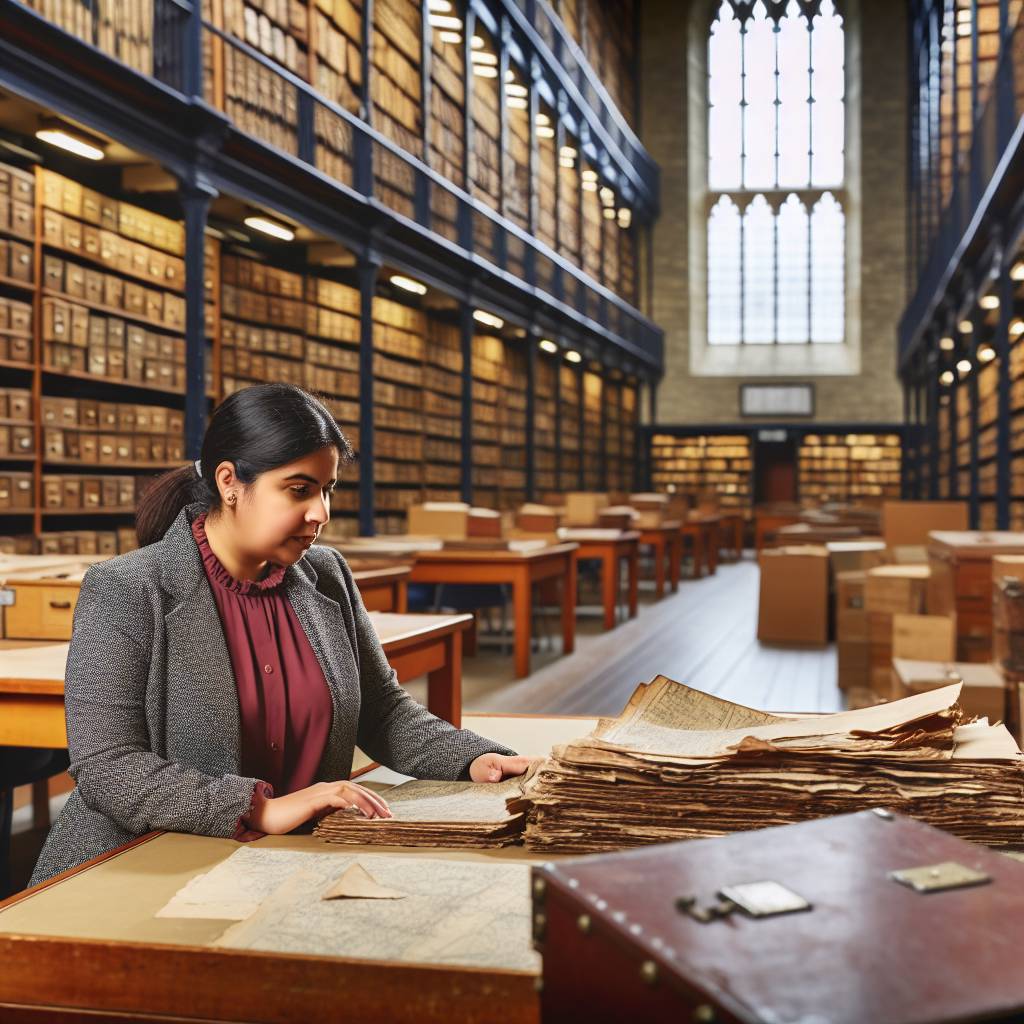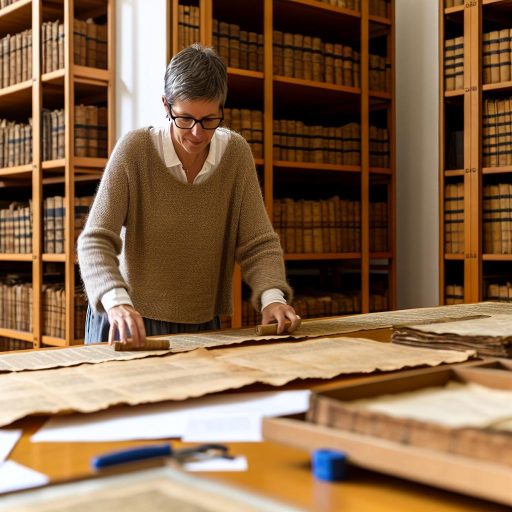Introduction to Archival Science in Canada
Archival science plays an essential role in preserving our collective memory.
In Canada, this field has evolved significantly over the years.
Professionals in this area work tirelessly to safeguard documents for future generations.
Moreover, they ensure that records remain accessible and usable over time.
The Importance of Archival Science
Archival science fosters a greater understanding of historical contexts.
It aids researchers, historians, and the public in exploring the past.
Additionally, it contributes to societal memory, shaping cultural identity.
The Role of Canadian Archivists
Canadian archivists specialize in organizing, describing, and preserving records.
They also undertake appraisal to determine a document’s historical value.
Furthermore, they implement preservation techniques to maintain records’ integrity.
Key Organizations Supporting Archival Science
Several professional organizations promote archival practices across Canada.
- The Association of Canadian Archivists provides resources and training.
- Library and Archives Canada offers guidance and support to archivists.
- The Archives Association of British Columbia focuses on regional archival issues.
Challenges in the Field
Archival science faces various challenges in today’s digital age.
Digital records require new preservation methods and tools.
Additionally, funding and resources often limit organizational capabilities.
Despite these challenges, professionals continue to adapt and thrive.
Understanding the Role of an Archivist
Definition and Purpose
An archivist is a professional responsible for preserving important records.
This role helps maintain a record of history and culture.
Archivists ensure that historical documents are accessible to the public.
They contribute to the organization of archival collections.
Main Responsibilities
Archivists manage both physical and digital archives.
They assess, acquire, and process materials for inclusion.
Additionally, archivists provide reference services to researchers.
They educate the public about the significance of archival materials.
Skills Required
Strong analytical skills are essential for an archivist.
Attention to detail aids in preserving documents accurately.
Unlock Your Career Potential
Visualize a clear path to success with our tailored Career Consulting service. Personalized insights in just 1-3 days.
Get StartedEffective communication skills enhance interaction with the public.
Technological proficiency is increasingly important in modern archives.
Educational Background
A master’s degree in archival science or a related field is often required.
This education equips archivists with necessary theoretical knowledge.
Courses in history, management, and information science are beneficial.
Professional Development
Networking is vital within the archival profession.
Joining professional organizations can offer valuable resources.
Participating in workshops and conferences helps to stay updated.
Certification programs are available for archivists seeking credentials.
Educational Requirements for Aspiring Archivists
Understanding the Role of Archivists
Archivists play a crucial role in preserving historical records.
They manage collections of documents and historical materials.
Additionally, they ensure these records remain accessible for future generations.
Educational Background
A bachelor’s degree is the minimum requirement for aspiring archivists.
This degree may be in history, library science, or a related field.
However, many employers prefer candidates with a master’s degree.
A master’s degree in archival studies is particularly beneficial.
Courses often cover topics such as preservation, digital archiving, and research methods.
Specialized Certification Programs
Professional certification enhances job prospects in this field.
The Canadian Archival Association offers a certification program for archivists.
Certification demonstrates a commitment to professional standards.
Moreover, it helps in establishing credibility with employers and clients.
Hands-On Experience
Gaining practical experience is vital for aspiring archivists.
Volunteer work or internships can provide valuable insights into the profession.
Many programs offer field placements as part of their curriculum.
These experiences allow students to apply theoretical knowledge in real-world settings.
Continuing Education and Professional Development
Archivists must stay updated on industry trends and technologies.
Participating in workshops, webinars, and conferences can enhance skills.
Furthermore, membership in professional organizations provides networking opportunities.
These resources help archivists manage evolving archival practices.
Discover More: The Role of Authenticity in Canadian Digital Content Creation
Gaining Relevant Work Experience
Internships
Internships provide valuable hands-on experience in the archival field.
They allow you to apply theoretical knowledge in real-world settings.
Many organizations offer internship programs tailored for aspiring archivists.
Contact local archives, museums, or historical societies for opportunities.
Internships can lead to job offers or networking opportunities.
Consider applying for competitive programs to enhance your resume.
Volunteer Opportunities
Volunteering can be an excellent way to gain experience.
Many institutions rely on volunteers for various projects.
You may manage collections, assist with digitization, or organize events.
Local libraries and community centers often seek volunteers for archives.
Use platforms such as Volunteer Canada to find suitable opportunities.
Volunteering can help you build essential skills and connections.
Networking and Professional Associations
Networking is crucial for professional growth in archiving.
Join organizations like the Association of Canadian Archivists.
Attend conferences and workshops to meet industry professionals.
Engage in online forums and social media groups dedicated to archives.
Networking can lead to mentorships and job referrals.
Participate actively in discussions to strengthen your professional presence.
Building a Strong Portfolio
A portfolio showcases your skills and experience.
Include evidence of your work from internships or volunteer positions.
Highlight projects that demonstrate your archival abilities.
Organize your portfolio to make a compelling presentation.
Consider including case studies or samples of digitization work.
A well-crafted portfolio sets you apart from other candidates.
You Might Also Like: Best Places in Canada to Hone Your Photography Skills
Preparing for Certification: The Canadian Archivists’ Certification Exam
Understanding the Certification Process
Becoming a certified archivist is a structured process.
The Canadian Archivists’ Certification Exam is a key requirement.
This exam ensures that archivists meet national standards.
It is important to familiarize yourself with the exam structure.
Gathering Relevant Educational Background
A degree in archival studies or a related field is essential.
Many institutions offer specific programs for aspiring archivists.
Courses should cover topics such as records management and preservation.
Additionally, experience in an archival environment is beneficial.
Gaining Practical Experience
Prospective archivists should seek internships or volunteer positions.
Hands-on experience helps build essential skills.
Consider working in libraries, museums, or cultural institutions.
Networking within these communities can open future opportunities.
Reviewing Study Materials
Familiarize yourself with recommended literature for exam preparation.
Many organizations provide study guides and resources.
Reviewing past exam questions can enhance your understanding.
Additionally, consider forming study groups with peers.
Preparing for the Exam Day
Set aside time for revision in the weeks leading up to the exam.
Ensure that you understand the exam format and duration.
On the exam day, arrive early and relax.
A calm mindset will help you think clearly during the test.
Explore Further: Effective Strategies for Growing Your Content Creator Brand

Continuing Professional Development and Lifelong Learning
Importance of Continuing Education
Continuing education is critical for archivists in Canada.
It ensures compliance with evolving professional standards.
Furthermore, it helps archivists adapt to changes in technology.
Embracing lifelong learning cultivates professional growth.
Available Learning Opportunities
Various options exist for continuing professional development.
Workshops and webinars are popular formats for learning.
Professional organizations often offer these resources.
For instance, the Association of Canadian Archivists provides numerous events.
Additionally, online courses are increasingly available.
These courses can cater to diverse learning preferences.
Professional Certifications and Workshops
Pursuing certification enhances an archivist’s credentials.
For example, the Certified Archivist designation is well-recognized.
Workshops focused on specific skills are also beneficial.
These may cover digital archiving, preservation techniques, and more.
Moreover, participating in regional conferences promotes networking.
Networking for Lifelong Learning
Joining professional associations fosters valuable connections.
Networking with peers provides insights into industry trends.
Moreover, mentors can offer guidance through career stages.
These relationships enhance knowledge sharing among professionals.
Staying Informed of Industry Developments
Reading professional journals is key for staying updated.
These publications often highlight best practices and innovations.
Participating in local meetups can also be an informative trend.
Here, professionals can discuss challenges and solutions.
Furthermore, online forums and social media groups provide added support.
See Related Content: Understanding Analytics for Canadian Digital Content Creators
Networking and Professional Organizations in Archival Science
Importance of Networking
Networking plays a critical role in advancing your career in archival science.
Strong connections help you stay informed about industry trends.
Additionally, networking can open doors to job opportunities.
Meeting professionals in the field can provide valuable mentorship.
Collaborating with others can enhance your skills and expertise.
Professional Organizations
Joining professional organizations is a vital step for aspiring archivists.
Organizations like the Association of Canadian Archivists (ACA) offer resources and support.
Membership in these organizations often includes access to workshops and conferences.
These events are excellent opportunities for networking and learning.
Additionally, they frequently publish journals with the latest research in the field.
Local Chapters and Networking Events
Many professional organizations have local chapters.
These chapters host regular networking events for members.
Participating in these events allows you to connect with peers in your area.
Moreover, they foster collaborative opportunities on projects and initiatives.
Attending these gatherings can also enhance your visibility in the community.
Online Communities
In today’s digital age, online communities can provide substantial networking benefits.
Social media platforms facilitate connections with professionals worldwide.
Participating in forums and discussion groups can yield valuable insights.
Online workshops and webinars allow for flexible learning opportunities.
You can engage with experts in the field from the comfort of your home.
Volunteering
Volunteering for archival projects enhances your skills and expands your network.
Many organizations seek out volunteers for assistance on various initiatives.
This experience can lead to valuable references and job recommendations.
Additionally, it allows you to meet professionals with similar interests.
Building relationships through volunteering is a meaningful way to engage with the community.
Career Opportunities and Advancement for Certified Archivists
Overview of the Archivist Profession
Archivists play a crucial role in preserving cultural heritage.
They manage, organize, and protect valuable records and documents.
In Canada, archivists are essential for institutions across various sectors.
Job Opportunities for Certified Archivists
Certified archivists can find employment in diverse environments.
They may work in government agencies, universities, and museums.
Additionally, many archivists serve in private corporations and non-profit organizations.
These positions often involve digitizing archives and developing archival policies.
Advancement Opportunities
Advancement in the field is possible with experience and additional training.
Archivists may move into management roles or specialize in specific areas.
Leadership positions often involve overseeing staff and budgets.
Some archivists choose to advance their education to enhance their skills.
Professional Associations and Networking
Joining professional associations benefits archivists seeking advancement.
Organizations like the Association of Canadian Archivists offer resources and support.
Networking at conferences creates opportunities for collaboration and career growth.
Furthermore, participating in workshops helps archivists stay current in the field.
Impact of Technology on Career Advancement
Technology is transforming the archivist profession rapidly.
Digital archiving requires new skills and knowledge of software.
Certified archivists who embrace technology will have greater job prospects.
Moreover, understanding digital preservation techniques is becoming essential.
Additional Resources
Evelyn Davis – Archivist – Prairie View A&M University | LinkedIn




